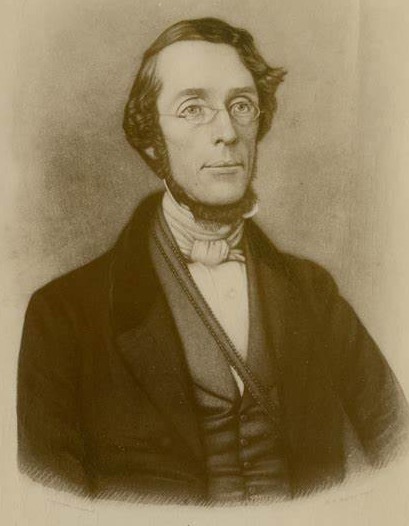In 1852, the faculty of the Law School was enlarged when James P. Holcombe joined John B. Minor as a professor. He was descended on both sides from military officers of the Revolutionary War. He married young and moved to Cincinnati to practice law. Holcombe’s parents left their home in Lynchburg to settle in Indiana in order to raise their younger sons in a state free from slavery. They not only freed their own enslaved persons (15 in total) before leaving but even refused a large inheritance because it included enslaved persons. Though his parents were ardently anti-slavery, Holcombe himself became the strongest supporter of secession among the University faculty. Holcombe was remembered as “an orator of unusual power.” He resigned in March 1861 to become a candidate for membership in the Secession Convention, where he was elected. As Philip Bruce describes in The History of the University of Virginia, 1819-1919, “The brooding peace of the arcades, the calm dignity of the teacher’s platform, the varied charms of literature, the bonds of intellectual friendship,--all were left behind, in the spirit of a medieval knight, as he withdrew from the precincts to put his great talents at the disposal of the new-born nationality.”[1]
Although census records do not show exactly how many enslaved persons Holcombe owned, Holcombe’s writings and speeches reveal him as an unwavering supporter of slavery. He used his own interpretations of moral and legal philosophy to justify the practice of slavery in the United States as is reflected in student notes from his lectures. In an 1858 address to the Virginia State Agricultural Society titled “Is Slavery Consistent with the Natural Law?” Holcombe stated that in a state of nature it would still be the duty of the white race to “reduce the negro to subjection.”[2] Holcombe became a representative to the Confederate Congress in 1861 and did not return to the University after the war. He died in 1873.[3]
[1] “James P. Holcombe,” University of Virginia Arthur J. Morris Law Library, accessed 25 August 2020.
[2] “Is Slavery Consistent with the Natural Law?”
Sources
Books
- A Compendium of Mercantile Law (with William Y. Gholson) (Appleton, 3d ed. 1855)
- Barton’s History of a Suit in Equity: From Its Commencement to Its Final Termination (R. Clarke, rev. ed. 1859)
Articles
- Is Slavery Consistent with Natural Law?, 27 S. Literary Messenger 401-421 (1858)
Of the definition of slavery, he writes: “Slavery we may define, so as to embrace all the elements that properly belong to it, as a condition or relation in which one man is charged with the protection and support of another, and invested with an absolute property in his labour, and such a degree of authority over his person as may be requisite to enforce its enjoyment.”
Other
- An Address Delivered Before the Society of Alumni, of the University of Virginia, at Its Annual Meeting (Macfarlane & Fergusson, 1853)
- Sketches of the Political Issues and Controversies of the Revolution (Virginia Historical Society, 1856)
- An Address Delivered Before the Seventh Annual Meeting of the Virginia State Agricultural Society (Macfarlane & Fergusson, 1858)
- The Election of a Black Republican President: An Overt Act of Aggression on the Right of Property in Slaves (C.H. Wynne, 1860)
*By “Black Republican president,” Holcombe means an abolitionist Republican president.

